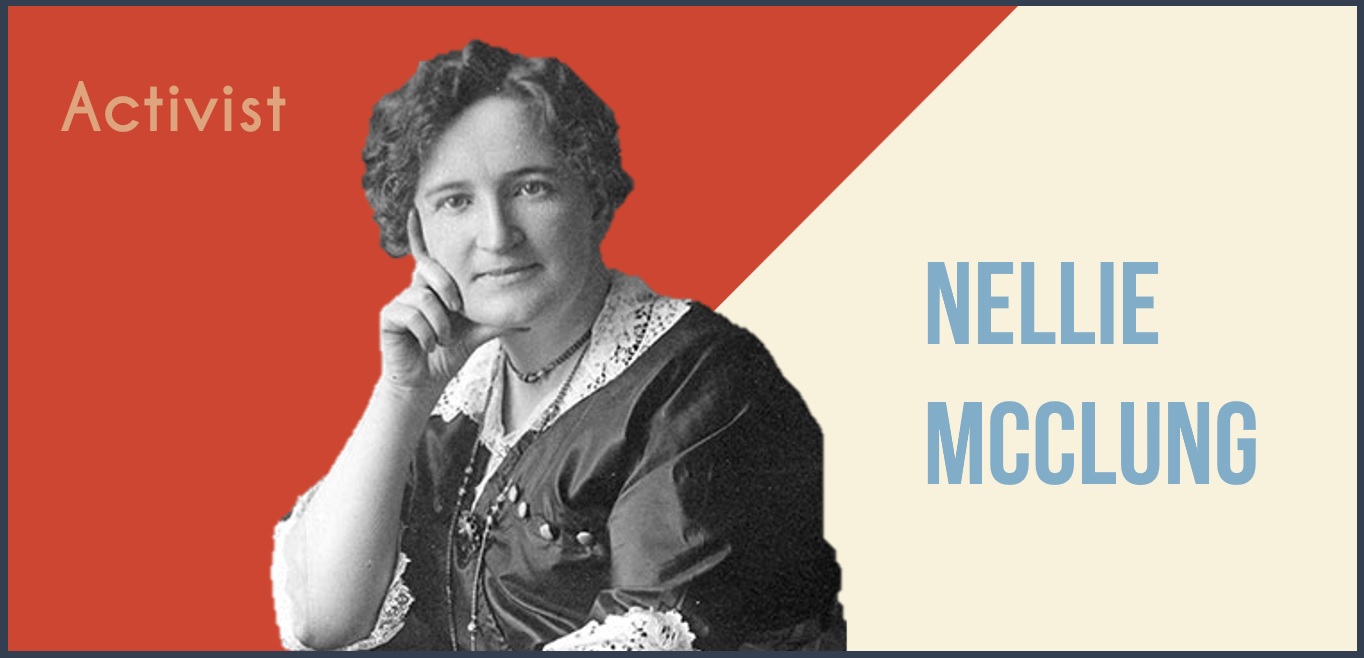Vocabulary
Before reading, translate these words.
Immigrant
Women’s suffrage
Work out (phrasal verb)
Suffrage
Suffragette
Satirical
Premier
Legislative Assembly
Give us our due!
Wake (in the wake of)
Labor market
Allowance
Composed of
Temperance
Contribution
Criticized
Eugenics
Sterilization
Feeble-minded
Instrumental
Biography
Early Life
Nellie McClung was born in Chatsworth, Ontario in 1873. She grew up on a farm. Her father was an immigrant. Unfortunately, the farm didn’t not work out, so the family moved to Manitoba in 1880. She only received six years of education. She didn’t learn to read until she was nine.
In 1908, McClung wrote Sowing Seeds in Danny. The novel was a bestseller. She continued writing short stories and articles while also becoming involved in politics.
Suffrage
In the early 1900s, women were not allowed to vote in Canada. So, in 1914 and 1915, McClung campaigned for the Liberal party of Canada. She was concerned with the issue of women voting. She helped to organize the Women’s Political Equality League. The group was devoted to women’s suffrage.
As a politician, McClung was known for her sense of humor. She even pretended to be the Premier of Manitoba in a satirical play. She made fun of the premier for his views on women’s suffrage. In the play, the actors argued about whether MEN should have the right to vote.
In 1914, McClung was invited to Legislative Assembly of Manitoba to speak about women’s rights. She asked, “Have we not the brains to think? Hands to work? Hearts to feel? And lives to live? Do we not bear our part in citizenship? Do we not help build the Empire? Give us our due!” Manitoba became the first province in Canada to grant women the right to vote in 1916. However, McClung had already moved to Edmonton, Alberta.
Politics
In 1921, McClung was elected to the Alberta Legislative Assembly as a Liberal. She remained an elected official until 1926. She was elected in the wake of World War 1. She understood that the role of women had changed while the men were out fighting the war. More women entered the labor market to fill the void left by men. McClung argued for property rights for married women, dental and medical care for children, mother’s allowance, factory safety requirements.
McClung was a part of many organizations. The most famous group that she was a part of was The Famous Five. The Famous Five was comprised of five women: Nellie McClung, Irene Parlby, Henrietta Muir Edwards, Emily Murphy, and Louise McKinney. They were a group of suffragettes. They petitioned the government to allow women to serve in the Senate. It led to the Persons Case. They asked if the word “qualified persons” applied to women as well as men. The Supreme Court of Canada decided that women were not included as “persons.” However, this was eventually overturned. This case gave women more power in politics. It also led to the first feminist movement in Canada.
McClung was also involved with the temperance movement. The temperance movement was a political movement to make alcohol illegal. Alcohol was illegal during 1915 and 1916 in Canada. However, after the war, most provinces made it legal again. Most provinces did this during the 1920s, but PEI didn’t start selling alcohol again until 1948.
Rediscovery and Criticism
McClung died in 1951, and she was mostly forgotten until the 1960s when the feminist movement discovered her contributions (as well as The Famous Five). However, she has criticized lately.
McClung, like the other members of the Famous Five, is often criticized for being racist and elite. The believed in eugenics and that they could improve society by discouraging reproduction and promoting sterilization of “metal defectives” and the “feeble-minded”. They thought that “mental defectives” included alcoholics, sexually promiscuous people, the mentally ill, the poor, and criminals. McClung and Emily Murphy are considered the two most prominent and influential supporters of forced sterilization. There were forced sterilization laws in Canada from 1928 to the 1970s.
McClung also thought that women were the guardians of their “race.” So, she joined politics to promote legislation against prostitution, alcoholism, and “mental defectiveness.” She thought that she had a duty to protect the White race. McClung is remembered as someone who was instrumental in women’s rights but had some character flaws.
Questions
The questions will guide you through the reading and give a deeper understanding of the text
- Where was Nellie McClung born?
- Her first novel was a bestseller. What was the title?
- Why did McClung campaign in 1914 and 1915?
- She played a politician in a play. What was the play about?
- When was she elected to the Alberta Legislative Assembly?
- How did World War 1 change the role of women in society?
- What rights did McClung argue for while she was a politician?
- What famous group was she a part of?
- What was the Persons Case?
- What was the temperance movement?
- Should alcohol be illegal in Korea?
- Why is McClung criticized?
- Some people want to erase McClung’s contributions to feminism because of her views on eugenics and her racism. What do you think about that? Should be ignore bad qualities if a person helps society?
- Do you agree with McClung’s views on women’s rights, eugenics, the temperance movement, and forced sterilization?


